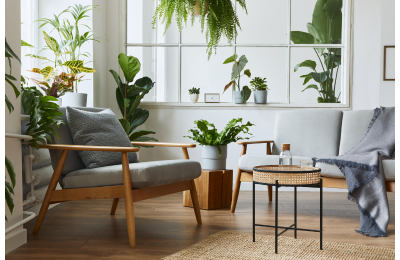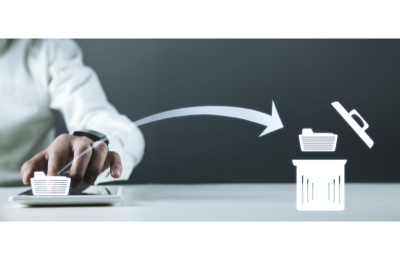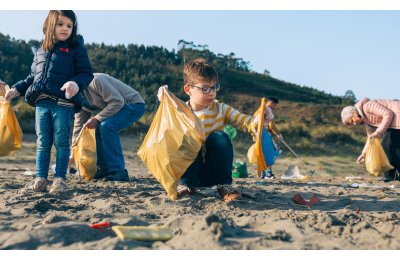Creating a sustainable legacy through small changes
5 min read
The world has become a place where consumerism often encourages excess and clutter, which sounds awfully dire, but thankfully, there is hope. A growing movement towards simplicity and sustainability is having a rippling effect with more people desiring to make changes that take consideration for our planet. For many, this journey begins at home with simple yet effective actions, taking one small step at a time.
In our final blog of Spring Clearing Week 2024, APDO member Sheena Taylor shows us how making more conscious choices and actively engaging with our local communities can create a sustainable legacy that paves the way for a brighter future for generations to come.
Embracing Small Changes

To create meaningful changes that can be maintained and adopted as habits, it is key to embrace one small action and embed it as practice before adding another one. Each activity, which may seem inconsequential, can build and build resulting in a positive impact on our environment. Here are some very reachable, down-to-earth steps to take:
1. Reduce Food Waste
In the UK every year, 9.5 million tonnes of food are wasted. This shocking amount is not only an immense waste of food and money, but it also causes harmful gases such as carbon dioxide and methane to be released from landfills. Furthermore, there is the added guilt that most of us feel whenever food is thrown away. Thankfully, these days there are plenty of easy tips and recipes that can be found online at Love Food Hate Waste or Nancy Birtwhistle to keep food waste to a minimum.
2. Choose Home Delivery
Most people may never have considered how having groceries delivered straight to our homes is beneficial for our planet, but it is. Having one van driving around delivering to houses in the same area reduces the number of cars driving back and forth from the local supermarket. In addition, many supermarkets are already investing in electric vehicles to cut down on carbon emissions, making those deliveries even more eco-friendly. An added benefit on a personal level is that home delivery also cuts down on impulse buying, which decreases food waste, and possibly waistlines, too.
3. Add Plants to a Home

Plants can improve air quality, and it is well-known that they take in carbon dioxide and convert it to oxygen. But did you know that they can also reduce the nitrogen dioxide levels in our homes? While almost any house plant will achieve this result, certain plants such as peace lilies and Boston ferns can also decrease the mould found in the air, making them perfect for humid bathrooms. Although plants can improve the air quality in our homes, some furniture and carpets achieve the opposite by releasing formaldehyde. The solution is to keep plants such as weeping figs indoors to remove this toxic gas from the air.
4. Empty Inbox Mail

Huge data-centres around the world are powered by increasing amounts of electricity, trying to keep up with society’s internet usage and stored information. One simple way to reduce our environmental impact is to lower the number of emails in our inboxes and to ensure that email bins or trash are emptied regularly. Unsubscribing from newsletters and lists will decrease the number of messages coming into an inbox. All these actions can reduce the electricity being used to store this data.
Inspiring and Supporting the Local Community
As well as individual changes, taking part within local communities can increase the influence of our efforts. Here are a few ways that we can inspire and support those around us:
1) Attend Eco Events
There are plenty of workshops, conferences such as APDO’s Inspiring a Sustainable Future, meetups and events like Clean & Tidy Show focused on eco-friendly practices like composting, zero-waste living or connecting with nature that increase awareness of issues and offer solutions. Sharing our knowledge and exchanging ideas with other like-minded individuals creates the camaraderie of having common goals, making it easier to commit and stick with any lifestyle modifications we choose to make.
2) Aim to Buy Food Locally
Choosing to attend farmers’ markets, artisan fairs and shops close to home where eco-conscious practices are encouraged is another viable suggestion. By supporting local businesses, we contribute to healthy economies right on our doorsteps, and in the same instance, reduce our environmental impact of long-distance transportation and mass production of food products. Schemes by local farmers to create high quality, homegrown foods should be encouraged as they offer a much better long-term ecological solution for our planet.
3) Collaborate with Others

Many local businesses and non-profits have launched environmentally-friendly initiatives to support their long-term plans. Researching and then partnering with these organisations provides opportunities to build collaborations within our communities. Whether it’s organising clean-up campaigns, tree planting or recycling schemes, working together with local establishments during these events fosters a sense of community pride, with the added benefit of protecting the environment.
Cultivating a Sustainable Legacy Together
As individuals, we can change the world around us and can inspire others too with our passion for loving our planet. By taking small actions in our daily lives and engaging and working with our local communities, we have the power to create lasting repercussions that extend far beyond ourselves.
In our journey towards increasing our eco-friendly practices, every action, no matter how small, has an impact. Using collaboration locally, we will begin to build a world where sustainability is not just a goal but a part of our everyday lives. Together, let’s sow the seeds of change and cultivate a sustainable legacy that thrives for years to come.
Sheena Taylor, founder of Your Professional Organiser, and APDO’s Reuse and Recycling Coordinator, is an eco-friendly life organiser who helps busy, working women to create decluttered, easy-to-tidy homes so that they have more free time to use however they want. Sheena lives in South Croydon with her husband and son, and cat, Maisie. You can find out more about Sheena by visiting her website, yourprofessionalorganiser.co.uk.






